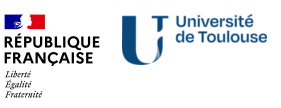Diplôme
Master (LMD)
Domaine(s) d'étude
Bioingénierie - Biotechnologies, Biologie - Biochimie, Génétique, Biologie et Santé, Neurosciences, Bioingénierie - Biotechnologies, Agronomie, Biosciences végétales, Œnologie, Sciences et industries agroalimentaires, Ingénierie agronomique, Microbiologie
Accessible en
Formation continue, Formation initiale, Formation en apprentissage, VAE
Établissements
Université Toulouse III - Université de Toulouse
Présentation
Ce parcours de master comprend deux années (60 ECTS chacune).
Première année (M1) :
The 2nd year (M2) is an international Master's degree program based on a solid training in structural and functional biochemistry. Students will be offered theoretical and technical training in most of the cutting-edge techniques in this field. Lectures will be provided in English language.
Students will be asked to select 3 courses among the 4 following items, in order to tailor their study program to suit their academic and career goals:
- Molecular biology & imaging: Principal aims in this course: i) to reinforce or to update your knowledge of the basic principles and methods used in molecular biology and imaging; to show you how to read, understand and analyze published articles concerning molecular biology topics. As it is a technical workshop, you will be asked to raise concerns regarding the experiments, to propose alternative techniques and to discuss the results presented in several publications.
- Integrative Structural biology of macromolecules: will provide you the conceptual and practical basis required to understand the current literature and will introduce you to the latest developments in the fields: advanced methodologies such as electron microscopy, X-ray crystallography, small angle X-ray scattering and nuclear magnetic resonance. It also requires a permanent use of computational biology, and the characterisation of interactions between molecules by biophysical methods such as ITC, microscale thermophoresis, SPR or DSF.
- Proteomics: Mass spectrometry-based approaches for global characterization of proteomes and interactomes, and structural exploration of proteins: Principle of mass spectrometry applied to proteins and peptides, basics of modern mass spectrometers, and presentation of the main workflows used in proteomic analysis (Bottom-up, top-down/middle-down, interactomics, Post-Translational Modifications, including sample preparation workflows).
- Metabolomics: in-depth understanding of the approaches (metabolomics, fluxomics) allowing the investigation of metabolism at the system level (from cells to whole organisms). NMR-based metabolomics & fluxomics. MS-Based metabolomics & fluxomics. The course includes lectures, exercises, and workshops on specific topics as well as illustrative examples of the application of metabolomics and fluxomics to address current challenges in Human health and in other major research fields.
Mandatory courses in Statistics, Bioethics, Scientific analysis and communication, and Basics of management will also be offered. In addition, students will have the opportunity to deepen their knowledge performing a scientific/technological project within the frame of academic or professional themes.
A full description of the Master program can be downloaded here (syllabus).
Objectifs
International program based on a solid training in structural and functional biochemistry. Students will be offered theoretical and technical training in most of the cutting-edge techniques in this field. Lectures are provided in English language.
Savoir-faire et compétences
Skills
- Design and implement an experimental strategy using modern approaches in molecular biology, imaging, metabolomics, proteomics, and structural biology, to answer a research question or test a scientific hypothesis;
- Conduct a project alone, or within a team;
- Critically analyze scientific articles in relation with cutting edge/hot topics in biology, and using techniques in the field of structural and functional biochemistry;
- Interpret and model experimental results using statistical and/or computer tools and querying the data banks of protein and nucleotide sequences and structures;
- Write and present in English language (written and oral scientific communication) a scientific project or a synthesis/report of a bibliographic or experimental research activity.
Admission
Pré-requis obligatoires
Admission in 2nd year (M2): Students originating from a first year of Master's in the area of Biochemistry, Biotechnology or Structural Biology from any University, are invited to apply. Admission to this master's degree is subject to the examination of an application by the faculty board and to an interview (on the campus or via visioconference). The number of seats is limited.
The criteria considered are the transcripts of the academic work (please provide these documents when applying) but also the motivation and personality of applicants.
Et après...
Poursuite d'études
Pursuit for higher education - in UT3: PHD in Écoles Doctorales Biologie-Santé-Biotechnologies (BSB) et Sciences Ecologiques, Vétérinaires, Agronomiques, Bioingénieries (SEVAB).

